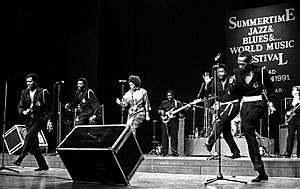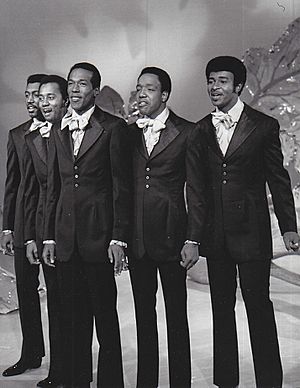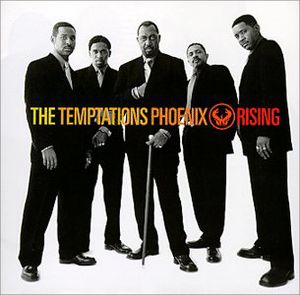The Temptations facts for kids
Quick facts for kids
The Temptations
|
|
|---|---|
 |
|
| Background information | |
| Also known as | Otis Williams & the Siberians, The Primes, The Distants, Otis Williams & the Distants, The Elgins, The Pirates |
| Origin | Detroit, Michigan, U.S. |
| Genres | R&B, soul, funk, doo-wop, rock and roll |
| Years active | 1960–present |
| Labels | Warwick, Miracle, Gordy, Motown, Atlantic, New Door/Universal |
| Associated acts | The Supremes, The Temptations Review, Smokey Robinson |
| Members | Otis Williams Ron Tyson Terry Weeks Joe Herndon Bruce Williamson |
| Past members | Elbridge "Al" Bryant Melvin Franklin Eddie Kendricks Paul Williams David Ruffin Dennis Edwards Ricky Owens Richard Street Damon Harris Glenn Leonard Louis Price Ali-Ollie Woodson Theo Peoples Ray Davis Harry McGilberry Barrington "Bo" Henderson G. C. Cameron |
The Temptations are a famous American singing group. They released many hit songs and albums with Motown Records in the 1960s and 1970s. They worked with producer Norman Whitfield. Their song "Cloud Nine" (1968) helped create a new style called "psychedelic soul." This style was important for the growth of R&B and soul music.
The group is known for their cool dance moves, special harmonies, and stylish clothes. The Temptations have sold millions of albums. This makes them one of the most successful groups in popular music history.
The group started in 1960 in Detroit, Michigan. They were first called The Elgins. The first members came from two other Detroit groups. These were Otis Williams, Elbridge "Al" Bryant, and Melvin Franklin from Otis Williams & the Distants. Also, Eddie Kendricks and Paul Williams were from the Primes.
In 1964, David Ruffin joined the group. He sang lead on many big hits. These included "My Girl" (1964), "Ain't Too Proud to Beg" (1966), and "I Wish It Would Rain" (1967). Dennis Edwards replaced Ruffin in 1968. The group continued to have hits like "Cloud Nine" (1969) and "Ball of Confusion (That's What the World Is Today)" (1970).
The group's members have changed often since 1971. Later singers included Richard Street, Damon Harris, Ron Tyson, and Ali-Ollie Woodson. With Woodson, they had a hit in 1984 called "Treat Her Like a Lady".
The Temptations had four number-one songs on the Billboard pop charts. They also had fourteen number-one songs on the R&B charts. Their music has won three Grammy Awards. They were the first Motown group to win a Grammy for "Cloud Nine" in 1969. In 2013, they received the Grammy Lifetime Achievement Award.
Six members of the Temptations were put into the Rock and Roll Hall of Fame in 1989. These were Edwards, Franklin, Kendricks, Ruffin, Otis Williams, and Paul Williams. Three of their classic songs are in "The Rock and Roll Hall of Fame's 500 Songs that Shaped Rock and Roll." These are "My Girl," "Just My Imagination (Running Away with Me)," and "Papa Was a Rollin' Stone." Rolling Stone magazine ranked The Temptations as number 68 on their list of the 100 Greatest Artists of all time.
Contents
The Start of The Temptations
The Primes and The Distants
The Primes
Best friends Eddie Kendricks and Paul Williams wanted to be musicians. They left their home in Birmingham, Alabama in 1955. After moving to Cleveland, Ohio, they settled in Detroit. Their doo-wop trio was called The Primes. They were famous in Detroit for their amazing performances. Their manager, Milton Jenkins, even made a sister group called The Primettes. This group included Florence Ballard, Mary Wilson, Diane Ross, and Betty McGlown.
Otis Williams & The Distants
Otis Williams moved to Detroit as a young boy. By 1958, he led a doo-wop group called Otis Williams & The Siberians. This group included Williams, Elbridge "Al" Bryant, James "Pee-Wee" Crawford, Vernard Plain, and Arthur Walton. They recorded a song called "Pecos Kid."
Later, Montgomery, Alabama native Melvin Franklin became the bass singer. Richard Street replaced Vernard Plain as lead singer. The group changed its name to Otis Williams & The Distants. They recorded two more songs: "Come On" (1959) and "Open Your Heart" (1960).
Becoming The Temptations
The Distants and The Primes knew each other well. They were friendly rivals. In late 1960, some members left both groups. Eddie Kendricks called Otis Williams. Williams offered Kendricks a spot in The Distants. Kendricks agreed, but only if Paul Williams could join too.
The new group included Otis Williams, Franklin, Bryant, Kendricks, and Paul Williams. They called themselves The Elgins. In March 1961, they tried to get a deal with Berry Gordy's Motown record label. Gordy agreed to sign them. But they had to change their name. Otis Williams and a Motown employee came up with the name The Temptations. Around the same time, The Primettes also signed with Motown. Gordy changed their name to The Supremes.
Early Success
The Temptations released two songs on Motown's Miracle label. Then, that label closed and joined the Gordy label. Six of their first seven songs, released between 1961 and 1963, did not become big hits. "Dream Come True" (1962) reached #22 on the R&B chart. Paul Williams and Eddie Kendricks often sang lead. Al Bryant, Otis Williams, and Melvin Franklin also sang lead sometimes.
Al Bryant did not like performing as much as his day job as a milkman. He became difficult to work with. After a Christmas party in 1963, Bryant was asked to leave the group. David Ruffin, the younger brother of Motown artist Jimmy Ruffin, took his place.
Many songwriters and producers tried to create a hit for The Temptations. But Smokey Robinson, the lead singer of The Miracles, worked best with them. In January 1964, Robinson helped write and produce "The Way You Do The Things You Do." Kendricks sang lead on this song. It became the Temptations' first Top 20 hit that April.
Later that year, Robinson and Ronald White wrote a song for David Ruffin to sing. The Temptations recorded it in the fall of 1964. That song, "My Girl," became their first #1 pop hit in December. Today, it is their most famous song. Ruffin also sang lead on their next three hits: "It's Growing," "Since I Lost My Baby," and "My Baby." All of these reached the Top 20 in 1965.
New Producer and New Sound
In 1966, Norman Whitfield became the Temptations' main producer. This happened after his song "Ain't Too Proud to Beg" did better on the charts than Smokey Robinson's "Get Ready".
Most of the songs Whitfield produced before 1968 featured David Ruffin singing lead. These included R&B #1 hits like "Beauty Is Only Skin Deep" and "(I Know) I'm Losing You." Other songs from this time included "You're My Everything" and "All I Need."

Between 1964 and 1968, The Temptations became international stars. They appeared often on TV shows like The Ed Sullivan Show. They also performed at famous places like the Copacabana in New York City.
Starting in 1968, Berry Gordy arranged for The Temptations to work with Diana Ross & The Supremes. They went on tour together. They also made two albums and two TV specials.
Psychedelic Soul Music
In late 1968, Norman Whitfield started producing a new style for The Temptations. It was based on the sound of the rock band Sly & The Family Stone. This new style began with "Cloud Nine" in the fall of 1968. It was very different from their earlier love songs. The music was more funky and had a stronger beat. All five Temptations took turns singing lead, like Sly & The Family Stone.
"Cloud Nine" was a Top 10 hit. It also won Motown its first Grammy Award for Best R&B Performance of 1968. This mix of the Motown sound and psychedelic rock created a new type of music called "psychedelic soul." Other artists like Diana Ross & The Supremes and Marvin Gaye also used this style.
More Temptations "psychedelic soul" songs followed. These included "Runaway Child, Running Wild," the #1 pop hit "I Can't Get Next to You," and "Psychedelic Shack" (1969). In 1970, they released "Ball of Confusion (That's What the World is Today)" and "Ungena Za Ulimwengu (Unite the World)."
The 1970s and Beyond
Otis Williams, Dennis Edwards, Melvin Franklin, Richard Street, and Damon Harris continued to record and perform. Norman Whitfield kept producing hits for them. These included "Superstar (Remember How You Got Where You Are)" (1971) and "Take A Look Around" (1972).
In 1972, Norman Whitfield released "Papa Was a Rolling Stone." He made a long, dramatic version for The Temptations. A shorter version was released as a single in September 1972. It became #1 on the pop charts. In 1973, "Papa Was a Rolling Stone" won The Temptations their second Grammy. Whitfield also won Grammys for this song.
After "Papa Was A Rolling Stone" became a hit, Whitfield started creating longer, more dramatic songs. These included "Masterpiece" (1973). The Temptations felt Whitfield was becoming difficult to work with. They complained to Berry Gordy. Gordy then assigned them to a new producer. Whitfield left Motown soon after.
Return to Motown and Reunion
Later, Louis Price left the group, and Dennis Edwards returned. Berry Gordy helped write and produce their first song under the new contract, "Power." It was a hit on the R&B charts.
In 1982, Motown planned a Temptations reunion tour. Eddie Kendricks and David Ruffin agreed to rejoin for the Reunion album and tour. Funk star Rick James wrote and produced the album's main song, "Standing On The Top." This song featured Ruffin, Kendricks, and Dennis Edwards. It reached #6 on the R&B charts.
The Reunion tour had all seven Temptations. But Kendricks' voice was weaker, and Ruffin missed some shows. After the tour, Ruffin and Kendricks left. They started performing together as a duo. Glenn Leonard also left and was replaced by Ron Tyson.
From the 1980s to the 1990s

By this time, The Temptations' songs were not as popular on the pop charts. But they still did well on the R&B charts. "Love On My Mind Tonight" reached #17. "Sail Away," produced by Norman Whitfield again, reached #13. In 1984, Edwards left the group for a solo career. Ali-Ollie Woodson replaced him. Woodson sang lead on the #2 R&B hit "Treat Her Like A Lady."
Woodson stayed with The Temptations until 1987. Then, Dennis Edwards returned for a second time. Dennis Edwards left The Temptations for the third and final time in 1988. Ali-Ollie Woodson rejoined the group. That same year, Otis Williams wrote his life story, Temptations.
In 1989, The Temptations were put into the Rock and Roll Hall of Fame.
In 1998, The Temptations released Phoenix Rising. This was their first album to sell over a million copies in more than twenty years. The song "Stay" from the album was a #1 hit on the adult contemporary charts. It used a part of their song "My Girl." By this time, Ali-Ollie Woodson and Theo Peoples had left. Barrington "Bo" Henderson and Terry Weeks joined the group.
The Temptations TV Show
In 1998, a four-hour TV show called The Temptations was shown on NBC. It was based on Otis Williams' book. The show was very popular. It was later shown on VH-1 and released on video.
Some people in the show felt it did not show them correctly. They filed a case against Williams, Motown, and NBC. But the judges decided in favor of the show's creators.
From 2000 to Today

The Temptations were put into the Vocal Group Hall of Fame in 1999. In 2001, their album Ear-Resistible won them their third Grammy.
Harry McGilberry passed away on April 3, 2006, at age 56.
The group's last Motown album, Legacy, came out in 2004. Later that year, The Temptations left Motown. They moved to another Universal label, New Door Records. Their album Reflections (2006) had covers of popular Motown songs.
Former member Ali-Ollie Woodson passed away on May 30, 2010, after a long illness.
On May 4, 2010, the group released their album Still Here.
The Temptations received the Grammy Lifetime Achievement Award on February 9, 2013. Otis Williams, Dennis Edwards, and the children of other members accepted the awards.
Former member Damon Harris passed away on February 18, 2013. Nine days later, former member Richard Street passed away.
Dennis Edwards passed away on February 1, 2018, two days before his 75th birthday.
On May 4, 2018, The Temptations released All the Time. This was their first album since 2010.
Founding member Otis Williams said The Temptations will record a new album after the coronavirus pandemic.
Past member Bruce Williamson passed away on September 6, 2020, from problems related to COVID-19. He was 49.
Members of The Temptations
Current Members
- Otis Williams (1960–present)
- Ron Tyson (1983–present)
- Terry Weeks (1997-present)
- Willie Green (2015–present)
- Mario Corbino (2020–present)
Past Members
- Melvin Franklin (1960–1995) (passed away 1995)
- Eddie Kendricks (1960–1971, 1982 reunion) (passed away 1992)
- Paul Williams (1960–1971) (passed away 1973)
- Elbridge "Al" Bryant (1960–1964) (passed away 1975)
- David Ruffin (1964–1968, 1982 reunion) (passed away 1991)
- Dennis Edwards (1968–1977, 1980–1984, 1987–1989) (passed away 2018)
- Ricky Owens (1971) (passed away 1996)
- Richard Street (1971–1993) (passed away 2013)
- Damon Harris (1971–1975) (passed away 2013)
- Glenn Leonard (1975–1983)
- Louis Price (1977–1980)
- Ali-Ollie Woodson (1984–87, 1989–1996, 2002) (passed away 2010)
- Theo Peoples (1993–1998)
- Ray Davis (1995) (passed away 2005)
- Harry McGilberry (1996–2003) (passed away 2006)
- Barrington "Bo" Henderson (1998–2003)
- G. C. Cameron (2003–2007, 2019)
- Joe Herndon (2003–2015)
- Bruce Williamson (2006–2015) (passed away 2020)
- Larry Braggs (2015–2019)
See also
 In Spanish: The Temptations para niños
In Spanish: The Temptations para niños

